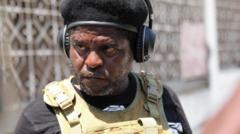**Kilmar Ábrego García's fate hangs in the balance as his wife pleads for justice amidst accusations and political maneuvering involving both nations.**
**El Salvador Refuses to Accept Deported US Man Amid Pressures from Trump Administration**

**El Salvador Refuses to Accept Deported US Man Amid Pressures from Trump Administration**
**Intense political dynamics unfold as El Salvador's President Bukele stands firm against the re-deportation of a man mistakenly sent back by the US government.**
El Salvador has announced its decision not to accept the return of Kilmar Ábrego García, who was mistakenly deported by the US. This declaration came from President Nayib Bukele during a White House encounter with Donald Trump, a leader he maintains close ties with. The US Supreme Court had previously ordered that the Trump administration must facilitate García's return, as he had been granted protections from deportation by an American court in 2019.
While the Trump administration insists it cannot legally bring him back, Attorney General Pam Bondi declared it is El Salvador's responsibility regarding García's potential re-entry. Trump praised Bukele for a partnership that would allow the US to deport alleged gang members to El Salvador, a move that has ignited controversy due to human rights concerns. García, having lived in Maryland with his family, was among a larger group of deportees sent back to a facility known for its severe conditions, described by human rights advocates as a "mega-prison."
During the meeting, Trump also expressed intentions to deport American citizens convicted of violent crimes back to Salvadoran prisons, stating that his administration should explore the legality of such actions. This broader agenda aligns with Trump’s objective of mass deportations and has been bolstered by Bukele’s readiness to receive US deportees, thus strengthening relations between the two nations.
García's wife, Jennifer Vasquez Sura, a US citizen, voiced her concern over the political tussle impacting her family, stressing their fight for justice. The US government has acknowledged that García's case was the result of an "administrative error," despite the Trump administration's claims of his affiliation with MS-13, a designation his attorney refutes vehemently.
In a calculated political maneuver, Bukele's government has benefitted from financial incentives offered by the US for each deportee, with payments estimated at up to $20,000 per person annually. Critics of Bukele argue that his cooperation with the US undermines the judiciary and raises questions about human rights practices in El Salvador, especially as his administration has executed numerous arrests under a controversial state of emergency, with reports of due process violations.
As political tensions simmer, observers continue to monitor the fallout from García’s case and the implications of US-El Salvador relations going forward.
While the Trump administration insists it cannot legally bring him back, Attorney General Pam Bondi declared it is El Salvador's responsibility regarding García's potential re-entry. Trump praised Bukele for a partnership that would allow the US to deport alleged gang members to El Salvador, a move that has ignited controversy due to human rights concerns. García, having lived in Maryland with his family, was among a larger group of deportees sent back to a facility known for its severe conditions, described by human rights advocates as a "mega-prison."
During the meeting, Trump also expressed intentions to deport American citizens convicted of violent crimes back to Salvadoran prisons, stating that his administration should explore the legality of such actions. This broader agenda aligns with Trump’s objective of mass deportations and has been bolstered by Bukele’s readiness to receive US deportees, thus strengthening relations between the two nations.
García's wife, Jennifer Vasquez Sura, a US citizen, voiced her concern over the political tussle impacting her family, stressing their fight for justice. The US government has acknowledged that García's case was the result of an "administrative error," despite the Trump administration's claims of his affiliation with MS-13, a designation his attorney refutes vehemently.
In a calculated political maneuver, Bukele's government has benefitted from financial incentives offered by the US for each deportee, with payments estimated at up to $20,000 per person annually. Critics of Bukele argue that his cooperation with the US undermines the judiciary and raises questions about human rights practices in El Salvador, especially as his administration has executed numerous arrests under a controversial state of emergency, with reports of due process violations.
As political tensions simmer, observers continue to monitor the fallout from García’s case and the implications of US-El Salvador relations going forward.


















